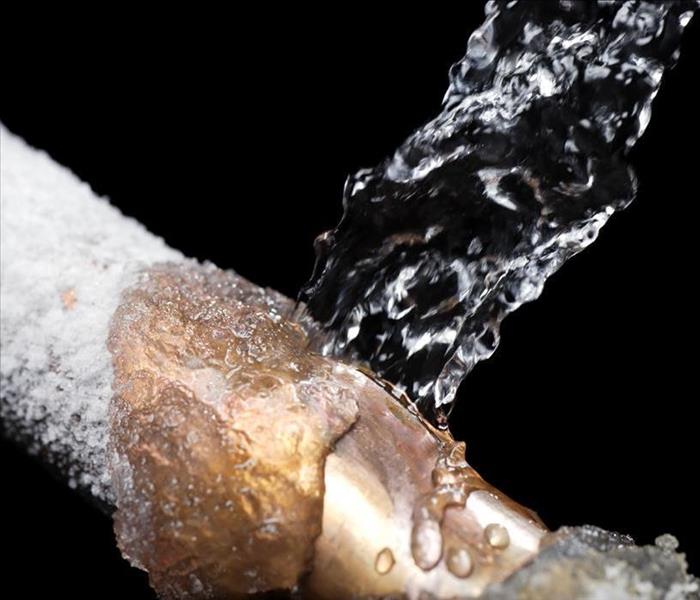Tips for Avoiding Frozen Pipes
1/2/2018 (Permalink)
What's worse than a major home maintenance disaster? Try several major home maintenance disasters at once. When a house's water pipes freeze, the situation is not as simple as calling a plumber. A 1/8-inch crack in a pipe can spew up to 250 gallons of water a day, causing flooding, serious structural damage, and the immediate potential for mold.
Frozen water pipes are a problem in both cold and warmer climates, affecting a quarter-million families each winter, and it can happen in homes with both plastic and copper pipes. It's all too common, especially considering this damage is largely preventable.
In addition to taking the usual preventive precautions, here are a few steps you can take to keep your pipes from turning frigid nights into inconvenient, and expensive ordeals.
Tip 1: Keep the Heat On!
This can be a make or break to coming home to a burst frozen pipe. Many people look to escape the winter months and go on vacations to a warmer destination. Be sure to keep your heat on when you're away! It doesn't need to be as high as it usually is, as you don't want to waste a lot of electricity when you're not at your home, so around 50º-55º F should keep those pipes warm enough.
Tip 2: Allow Faucet('s) to Drip.
If you're worried a pipe might freeze, allow your faucets to slightly drip. Allowing the faucet to be open like this will relieve pressure in the system. If a pipe freezes, it is actually the pressure that is created between the blockage and the faucet that will cause the pipe to burst. Allowing the faucet to be open will prevent this pressure from building up and thus, keep the pipe from bursting.
Tip 3: Keep Inside Doors and Cabinets Open
Pipes are often located in cabinets, like under your sink. When the temperatures drop, it is a good idea to keep these cabinet doors open so that the heat from the rest of the house can keep the pipes warm as well. You should also keep all interior doors open so that the heat can flow throughout the home.
Tip 4: Seal Cracks and Holes
You should caulk any holes or cracks that exist near pipes. This should be done on both interior and exterior walls. Doing so can help keep the cold air out and the warm air in. If you don't consider yourself a caulking extraordinaire, give SERVPRO of Overbrook/Wynnefield a call as we also have a construction side of the business and will happily walk you through the process :)
Tip 5: Apply Heating Tape
For pipes that are easily accessible, the electrical heating tape may be an option to keep them from freezing. This tape can be applied directly to the pipe. There are two types of heating tape. One type of heating tape turns on and off by itself when it senses heat is needed. The other type of heating tape needs to be plugged in when heat is needed and unplugged when not in use. Much like a space heater, these products can be dangerous, so you must follow the product’s direction and safety procedures exactly.
Tip 6: Add Extra Insulation
Pipes that are located in areas that do not have proper insulation, such as basements or attics, may need extra insulation to keep from freezing. Pipes in basements or attics are not the only ones that may not be properly insulated from the cold. If you have had a problem with pipes freezing anywhere in your home, extra insulation could be the cure.
Pipes can be fitted with foam rubber or fiberglass sleeves to help decrease the chances of freezing. This can be an easy solution for pipes that are exposed but can get expensive if walls, floors or ceilings have to be opened in order to properly insulate the pipe. Additional insulation can also be added to walls and ceilings to keep the pipes warm.
There is no full proof way to prevent all pipes from getting damaged during these cold winter months, but anything you can do in advance to help prevent a disaster will always be a good bet. If you do experience any disasters this winter give us a call at (215) 877-6653, we're available 24/7!





 24/7 Emergency Service
24/7 Emergency Service
